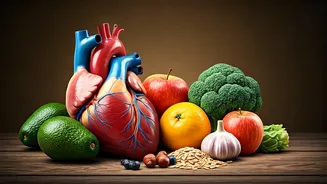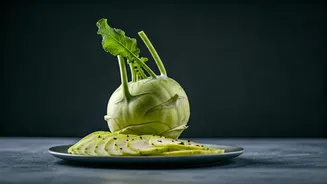Understanding Cholesterol Basics
Cholesterol, a waxy substance in your blood, is vital for building healthy cells. However, too much cholesterol, particularly LDL (low-density lipoprotein)
or 'bad' cholesterol, can lead to serious health issues. This excess cholesterol can accumulate in your arteries, forming plaque that narrows and hardens the arteries, a condition called atherosclerosis. This buildup elevates the risk of heart attacks and strokes. Healthy cholesterol levels are crucial for cardiovascular well-being. Keeping LDL cholesterol low and HDL (high-density lipoprotein) or 'good' cholesterol high helps maintain optimal arterial function, reducing cardiovascular disease risk. Regular monitoring and dietary adjustments are key to managing cholesterol effectively.
Oats: A Cholesterol Crusader
Oats are a champion for heart health due to their high soluble fiber content, particularly beta-glucan. Soluble fiber helps trap cholesterol in the digestive system, preventing its absorption into the bloodstream. Think of it as a cleanup crew that escorts excess cholesterol out of your body. Research indicates that consuming 1.5 grams of soluble fiber from oats daily can reduce total cholesterol by 5% to 8%. Starting your day with a bowl of oatmeal is an easy way to incorporate this beneficial grain. You can also add oats to smoothies, baked goods, or savory dishes for added fiber. Choose whole grain oats over instant varieties for maximum health benefits, and consider adding fruits, nuts, or seeds for extra flavor and nutrients.
Embrace the Power of Nuts
Nuts, especially almonds, walnuts, and cashews, are packed with heart-healthy fats, fiber, and plant sterols, contributing to lower cholesterol levels. These components help reduce LDL cholesterol by displacing saturated fats from the diet. Furthermore, nuts contain unsaturated fats and other beneficial nutrients. Almonds and walnuts are rich in monounsaturated fats, and walnuts provide alpha-linolenic acid, an omega-3 fatty acid linked to cardiovascular benefits. A handful of nuts (about 1.5 ounces) per day can positively impact your cholesterol profile. Add nuts to your salads, yogurt, or enjoy them as a satisfying snack. Be mindful of portion sizes, as nuts are calorie-dense. Opt for unsalted varieties to keep sodium intake in check.
Fatty Fish: Omega-3 Boost
Fatty fish, such as salmon, mackerel, and herring, are excellent sources of omega-3 fatty acids, which significantly benefit heart health. Omega-3s help reduce triglycerides, a type of fat in the blood, lower blood pressure, and slightly raise HDL cholesterol levels. These effects contribute to a decreased risk of heart disease. Aim to consume at least two servings of fatty fish per week. Consider grilled, baked, or steamed fish, which are healthier cooking methods. Avoid fried fish, as it often negates the benefits due to added unhealthy fats. Supplementation with fish oil capsules can be considered if you have difficulty incorporating fish into your diet. Consult your doctor for appropriate dosage.
Olive Oil's Heart Benefits
Olive oil, particularly extra virgin olive oil, is rich in monounsaturated fats, known to lower LDL cholesterol. It also contains antioxidants that protect blood vessels and reduce the risk of heart disease. Using olive oil in place of butter or other saturated fats in your diet is a simple yet effective strategy. Include olive oil in salad dressings, use it for sautéing vegetables, or drizzle it over cooked dishes. Choose extra virgin olive oil for its superior quality and higher antioxidant content. Be mindful of the quantity used, as it is calorie-dense. Always store olive oil in a dark, cool place to preserve its quality and flavor.
Avocados: A Creamy Savior
Avocados are packed with monounsaturated fats, similar to olive oil, making them a great choice for lowering LDL cholesterol. They also provide fiber and other nutrients that contribute to overall heart health. Replacing saturated fats with avocados can improve cholesterol levels and reduce the risk of heart disease. You can add avocados to sandwiches, salads, or smoothies. They can also be mashed and used as a spread, replacing mayonnaise or butter. A quarter or half an avocado per day is a good starting point. Incorporate avocados in your diet by enjoying them in their raw form. Remember to check for ripeness as needed.
Plant Sterols for Help
Plant sterols and stanols are naturally occurring compounds found in plants. They have a similar structure to cholesterol and can help lower LDL cholesterol by blocking its absorption in the small intestine. Many foods, like certain margarines, yogurts, and orange juice, are fortified with plant sterols and stanols. Consuming 2 grams of plant sterols or stanols daily can reduce LDL cholesterol by 7% to 10%. Check the labels of food products to ensure they contain plant sterols or stanols. Incorporate these foods as part of a balanced diet. Consult your doctor if you have concerns about the suitability of these products for your dietary plan.













